Check in
Welcome, new readers!
My work for the 100DaysProject has brought dozens of new subscribers. If you are one of them, welcome! I hope you will get comfortable and sit a spell.
Mission statement
Periodically, I share the things that are important to Becoming.
Take time, feel gratitude, forgive.
Remember what matters: Spirit, authenticity, justice, words.
Wait, and inspiration will come sooner than you think.
Let the work come. Don’t force it.
Let your little story come out and play.
Authentic
Authenticity matters. But what does it mean to be “authentic”?
An old meaning of authenticity is “being true to yourself.” Doing what is essentially you, discounting the expectations and whims of others. A more current way of saying that is “you do you.”
When are you being authentic? I’ll bet it’s when you are heavily engaged in whatever creative pursuits move you. In my case, the pursuit is writing. When I am in the “zone,” I am so in tune with my inner self that other considerations just fall away.
You can also be authentic apart from your creativity. Can you be authentic when you are doing mundane, quotidian tasks? Say, when you are making your bed or brushing your hair? Sure you can. Can I be authentic climbing onto my wheelchair, or chopping onions, or talking to a stranger at a bus stop? Sure I can.
I’m so wedded to the idea of authenticity that I catch myself smiling when I write about it. I want to always be true to myself. I hope I am.
Elm season
In the spring, in towns like Portland where Dutch elm disease is not prevalent and elm trees still thrive, their flat green-gold seeds, known as samaras, cover streets and lawns and sidewalks.
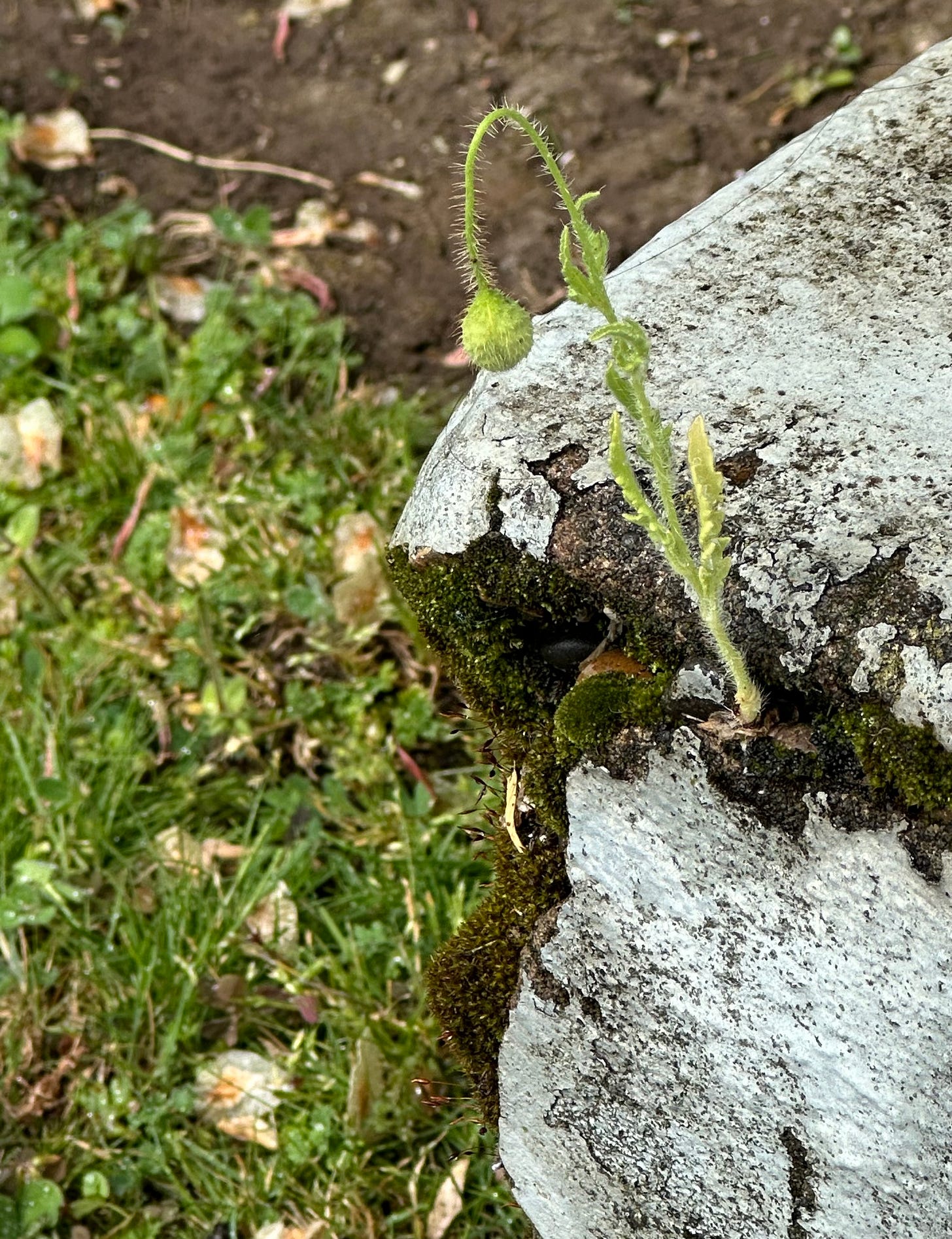
Elm seeds
Samaras, the gold coin of elms Spread out for us to walk on, Tracked into the foyer, Stuck to our shoes and sneakers And boots and Birkenstocks. Volunteer elms grow In the interstices of my garden, Ha! Garden! The yard’s vegetation Untended, it’s the disability, you know. Left to old bulbs that naturalize, Clover and dandelions And the remnants of ancient grapes. So much I can do now, Just not gardening So let that go, let it go Watch the samaras fall, Glowing in the sunlight Coins of the realm laid out at our feet.
Another elm
This distressed elm is so distended that it seems to pull the other elements in the frame into its wonkiness. Catch the curves in the car and the house.
Triad
Three words:
Precarious
Precocious
Precious
Precarious
This is our world today, precarious. Balancing on the edge, ready to fall and smash into a million shards. The world is brittle. And the shards may be sharp and piercing.
I like the word “precarity,” which is sometimes used in the same sense as precarious, though it has a narrower meaning: a lack of certainty, specifically in economic terms, as in not having enough food or rent money.
Precocious
Precocious is a friendlier word than precarious. This word can even make you smile. You associate it with precocious children, but it can describe anything that matures before its time, like a bottle of wine. Or that book that’s gestating within you and begs to be released early.
Precious
Both precarious and precocious can be precious, that is, valued for the meaning they hold. What is dear to us changes in precarious ways. Their precocity makes them precious. Hold on, hold on!
I purposefully keep these discussions brief, to allow you to add your own meanings to these words. They are worth considering, alone and together.
100 Days poem
I wrote some poems for the 100 Days Project before I got distracted and went down another path. This is one of them.
Touching the face of the divine
Feel the cheekbones, the brow. Brush the lashes, the lips, A face in repose, then snap— Gone in an instant. Why do you think Spirit cares? You know why, because you create. Go now and nuzzle the dog— Love in all actions you take. Spirit pushes my pen, I can’t help it If none of this sounds real at all. Later, I’ll fix what I can. But for now, these words are what comes.
Spring signs blossom
Handmade, heartmade signs appear in unexpected places in my neighborhood.
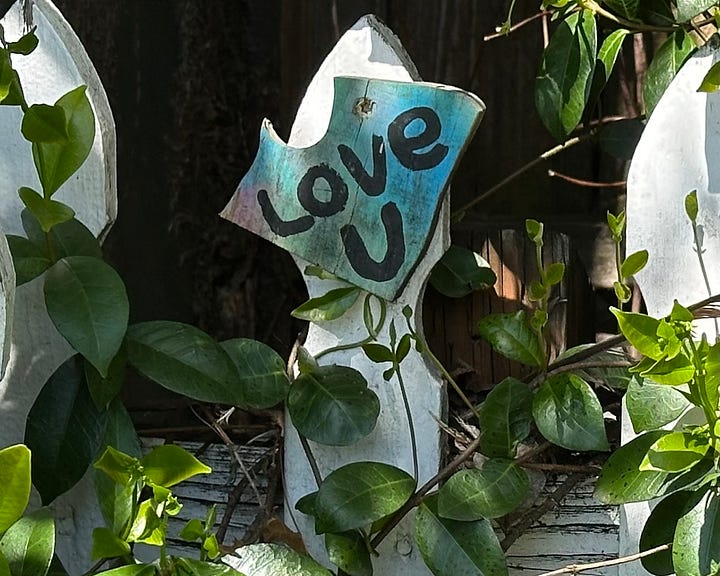

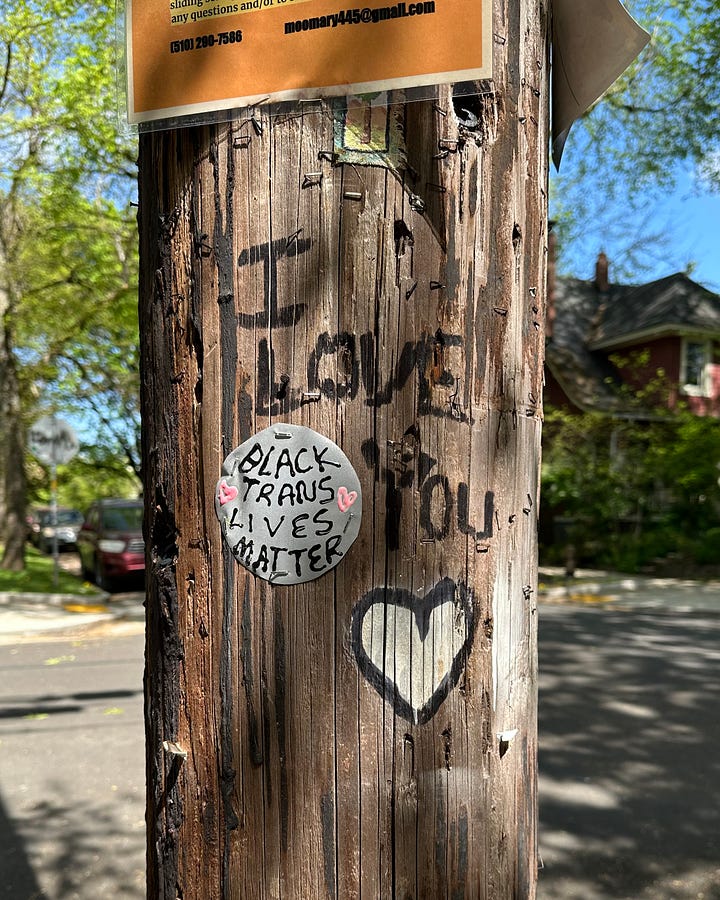
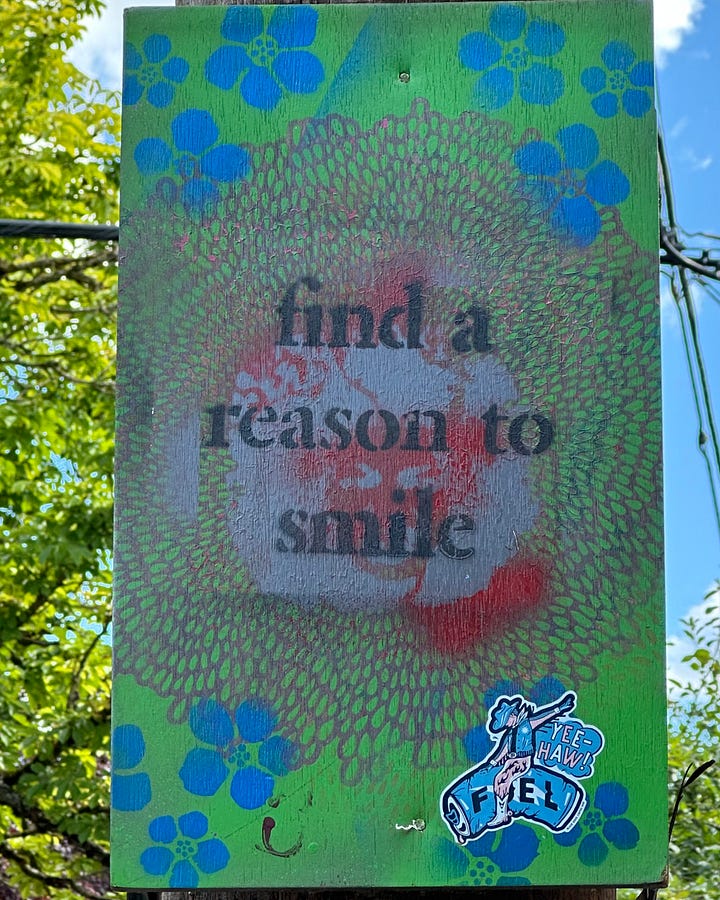
How I read
It’s been frustrating for me that I have so little time for reading. I don’t know how this can be. Reading is important to me. But somehow, pursuits like cleaning up email or riding the bus or food shopping or making dinner eat up the day.
I wish to read more, so I’ve come up with a plan to facilitate that. Like most plans and resolutions, this one may not stick. But I hope it does.
New regime
My reading habit had been to pick a book—there are always a few dozen stacked and panting to be read—and start reading. I marvel at what wonderful ideas the author has. I make pencil marks in the margins and take notes.
But soon, my ability to absorb all the new ideas and words wanes. I find myself reading the same words over again. I fantasize about reading this book three times to solidify my memory and understanding of it. Like I would ever have the resources to do that! Then I start losing focus. I might doze off.
This cycle doesn’t work well. I continually have to start a book over because I’ve lost track of the fictional narrative or the nonfiction writer’s thought process.
Here’s the plan
For the last week, I’ve been trying something new. I limit myself to a few pages of any book at a time. A chapter, if it’s not too long. Then I sit and reflect on what I’ve read.
I owe this idea to Simon Haisell of Footnotes and Tangents, whose slow reads of War and Peace and the Hillary Mantel novels are famous throughout Substack. Under his plan, you read a chapter a day over the arc of months or a year.
I just bought another big book, Don Quixote, in a new translation by Edith Grossman. I am reading one chapter a day. I find the next day I remember well what I read the day before.
I’m going to try the chapter a day method to crunch through several other tomes: The Recognitions, the Iliad, Infinite Jest, The Old Ways, The Power Broker.
Reading time
I read the big books in the evening, after dinner. The earlier part of my day is consumed with activities like writing, whacking away at email, going to the gym, riding the bus, cooking and eating dinner. I could read on the bus, but I’d rather watch the scenery, entranced even by the familiar streets and structures of well-known routes.
Later, before bed, I read shorter books, like memoirs and transformational nonfiction. I’m enjoying 23 Woodcock in 22 Years, by an astrophysicist who loves trekking in the woods. Real Magic by Elizabeth Gilbert I’ve mentioned before. The Creative Habit by Twyla Tharp is worth a very slow read.
There are many, many books. Let’s leave it at that.
Finally, just before turning in, I’ll read a poem or two. Right now I have book of poems by the Greek poet C. P. Cavafy, translated by Daniel Mendelsohn. Mendelsohn, well-known for books like The Lost and Three Rings, has also come out with a new translation of the Odyssey, just a few years after Emily Wilson’s stunning translation. Hers is in iambic pentameter, Mendelsohn’s is in dactylic hexameter. I’m looking forward to checking it out, whether or not I have time to read any or all of it.
And to you, reader
What are your reading habits? Are you finding it difficult to read books when there are so many other activities? Do you read books with bindings, or do you favor a tablet or e-reader? How can you possibly keep up with Substack when there are so many books to explore?
Let me write you a poem
I’ve had great success writing spontaneous poems for strangers. For me, this is a magical process. Each poem comes out different in concept, form and meter. I write them on the fly, yet they hold up well. Here on Becoming I’ve published poems I wrote at the Hawthorne Street Fair, the Kenton Street Fair in Wilbur and Denver, and the Tuba Christmas event in Pioneer Courthouse Square. But at farmers markets, my experiences have been different.
Poetry amid the vegetables
I was recently at the Hillsboro farmers market, a Saturday affair with dozens of vendors, and I offer to write poems there. As usual, I am sitting in my power chair with the “Let me write you a poem. It’s free” placard around my neck. But this day, not a single taker. I can’t even make eye contact with anyone.
I’ve had a similar experience at another huge weekly event, the Saturday farmers market at PSU. I can’t get any traction. However, I am asked to write plenty of poems when I visit smaller markets, such as Hillsdale or Lents.
It’s as if I am invisible at these bigger markets. Often, I’ve found, people don’t see the person, they just see the wheelchair.
Or maybe they just want to find the arugula.
There may be all sorts of reasons why I don’t get any takers. Yet I can’t help feeling rejected.
I’m not going back to Hillsboro. They can keep their stupid market. Phooey on them. It’s too long a trip, anyway, all the way to the end of the MAX blue line.
Regrets
You did the wrong thing, missed the right bus, Canceled the show you should have attended. Frightened a dog, upset your kids, Growled at your spouse over breakfast. Let it go, let it go! You can’t go back now. Take the next bus, apologize, it’s all you can do. You mostly do right, you know, focus on that. Everyone trips on life’s potholed path.
A poem for a friend
I was telling my friend Heidi about having no takers at the Hillsboro farmers market when it occurred to me that I could write a poem for her. She asked me to write about spring flowers.
These pansies that have volunteered to grow in a crack in the steps may be like the shy flowers in the poem, but they are also resilient.
Shy and bold
Some flowers are shy, pansies and hellebores, Others are mild, like bluebells. But azaleas and dogwood swell with assurance, Pulling on petals, thrusting them at us, Pink, white and yellow, spread for our liking, Laden branches so full of blossom A wonder they don’t break off. Soon, blossoms give way to fruit, As spring green turns summer dark. This special time, the time of all the flowers, Will pass us by. But roses will be here next.
The first rose of spring
Last year, I ran a photo of the last rose of summer. Here is the first rose of spring, that is, the first one I saw. Of course, as soon as I had photographed it, I saw all manner of other spring roses.
And finally . . .
Thank you for subscribing to Becoming. Thank you even more for reading it. I have a special appreciation for the core of readers who look forward to my posting every Saturday.
Please comment if anything I write moves you. It’s the thought bubble icon. While you’re at it, click on “like,” the little heart.
If you’re a free subscriber, you can easily upgrade to paid. It’s less than $1 a week for all these ramblings, all the photos and poems, week in and week out.
Or just tip me $5 at PayPal.



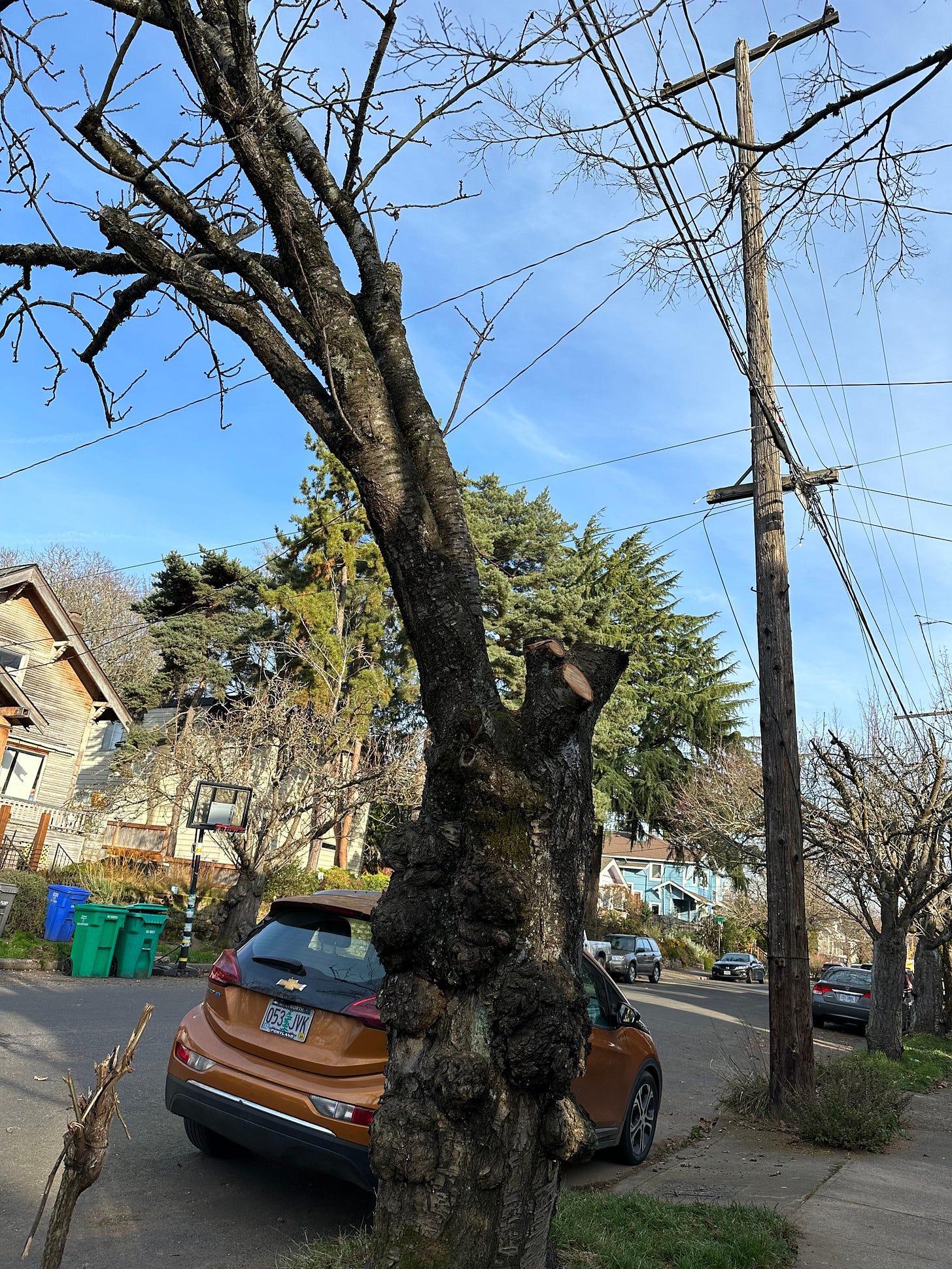

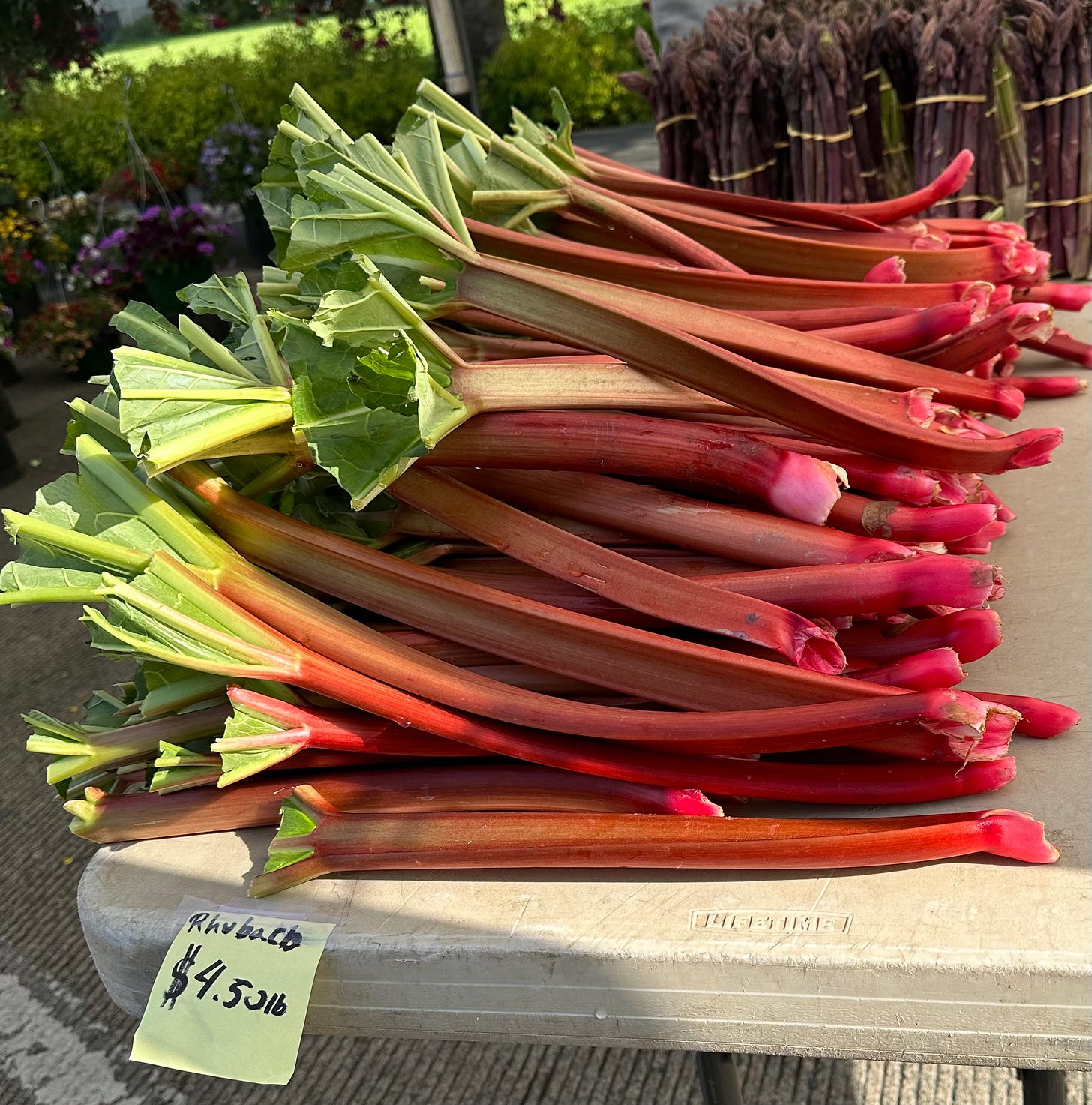


I had to giggle on your writing off the Hillsboro market, so to speak. And I love that you say 'phooey' ~ I've only heard Rex Stout use that expression.
I don't know if you listen to podcasts, but this is a favorite of mine: "Obscure with Michael Ian Black." Michael Ian Black is a comedian, but the podcast isn't designed for laughs. He reads and comments on a different book each season. Season 1 is Jude the Obscure, Season 2 is Frankenstein, Season 3 is Wuthering Heights. I got turned on to it during COVID lockdown, which coincided with me having developed difficulty concentrating enough to read.